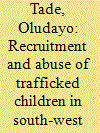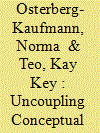| Srl | Item |
| 1 |
ID:
134353


|
|
|
|
|
| Summary/Abstract |
This article examines the recruitment and transportation of internally trafficked children from Benue State in the north-central geo-political zone of Nigeria to Oyo State in the south-western zone of Nigeria. The study is essentially qualitative: with the aid of the snowball sampling technique, in-depth interviews (IDIs) were conducted with drivers, employers and trafficking agents in two recipient communities in Ibadan. The findings show that human rights abuses manifest at the recruitment, transportation and destination phases. The human rights abuses include the recruitment of underage children for domestic work outside their immediate family environments; transportation under inhumane conditions; restriction of movement at traffickers' ‘warehouses’; non-disclosure of amount payable for the services of domestic servants by agents/traffickers; exclusion of domestic servants in wage negotiations; and violence by employers. In view of these, there is a need for the National Agency for the Prohibition of Trafficking in Persons to strengthen its internal trafficking campaign.
|
|
|
|
|
|
|
|
|
|
|
|
|
|
|
|
| 2 |
ID:
187732


|
|
|
|
|
| Summary/Abstract |
Democracy is subject to constant and seemingly interminable contestation in academic and policy contexts, and yet, empirically and methodologically robust analysis of what the term means in practice for actual citizens has remained an area of relative lacuna. Admittedly, large-N surveys have attempted to address this research gap by examining attitudes to numerous components of democracy, but without the fine-grained detail required to overcome simply reproducing the focus on liberal procedural, Western precedent-based, top-down approaches to understanding such a complex and varied political system. This article proposes a methodological approach, based on the requirements of comparative political theory and research into how people view democracy. This allows us to explore political attitudes and the meaning of democracy with a bottom-up approach using the methods of repertory grid and in-depth interviews. Singapore is a particularly exciting case for comparative political science: although it has all the advantageous conditions that, according to classic modernization theory, promote the development of democracy, it is still not a democracy.
|
|
|
|
|
|
|
|
|
|
|
|
|
|
|
|